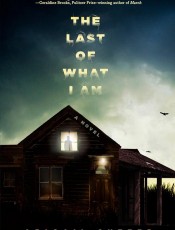The Last of What I Am
作者: Abigail Cutter 标签: 进入英语论坛“What really haunts us—our own mistakes, or the weight of history? Based closely on the true story of her own uncanny encounters in an inherited antebellum Virginia farmhouse and old lette...
“What really haunts us—our own mistakes, or the weight of history? Based closely on the true story of her own uncanny encounters in an inherited antebellum Virginia farmhouse and old letters she found there, Abbie Cutter has crafted a novel that plumbs the painful history of a common soldier in the Civil War and the burdens he cannot set down. A riveting read, rich in historic detail and moral complexity.”
“The Last of What I Am is a richly imagined tragedy of a Rebel soldier whose regret for ill-chosen allegiance haunts him from the moment of enlistment through the horrors of a union prison. It follows him into the afterlife, where he lingers in his ancestral home, unable to shed his shame for fighting for the cause of slavery. Masterful historical research and detail of the nineteenth century invest this story with a reader’s pleasure in a felt life. All of this with an ear for the poetry that lives in disaster.”
“A searing, brilliant, moving, and utterly original Civil War novel, told by the guilt-ravaged Virginia infantryman Tom Smiley, whose own war never ended—at least not until a young couple move into his now-historic childhood home and start renovating, literally taking the past apart brick by brick, pots and pans, faded velvet curtains, cedar chests and china dishes and rusted hairpins, and even the tattered blue handkerchief box that contains his medals from the Battle of Gettysburg twenty- fifth and fiftieth reunions . . . bringing it all back. A stirring meditation on guilt and redemption.”
—Geraldine Brooks, New York Times bestselling author and Pulitzer Prize winner of Horse and March
“Abigail Cutter has rendered the Civil War and its consequences with a rare power and eloquence, combining literary imagination with fidelity to history. She has allowed people who lived and breathed in the past to live and breathe again, telling us of loss and suffering we need to remember.”
—Edward Ayers, author and winner of the Bancroft Prize for In the Presence of Mine Enemies: Civil War in the Heart of America
“The Last of What I Am is a richly imagined tragedy of a Rebel soldier whose regret for ill-chosen allegiance haunts him from the moment of enlistment through the horrors of a union prison. It follows him into the afterlife, where he lingers in his ancestral home, unable to shed his shame for fighting for the cause of slavery. Masterful historical research and detail of the nineteenth century invest this story with a reader’s pleasure in a felt life. All of this with an ear for the poetry that lives in disaster.”
—John Rolfe Gardiner, author of Newport Rising and O. Henry Prize winner
“Abigail Cutter’s The Last of What I Am digs down to the dark and bloody roots of the Civil War that cling to us today. Graceful, unflinching, and wise, the book unearths one family’s tragedy and the ghosts that haunt it through four generations. This is a very well-told tale, set in the Shenandoah Valley, which Cutter knows in her bones.”
—John Pancake, former Arts editor at the Washington Post
“A searing, brilliant, moving, and utterly original Civil War novel, told by the guilt-ravaged Virginia infantryman Tom Smiley, whose own war never ended—at least not until a young couple move into his now-historic childhood home and start renovating, literally taking the past apart brick by brick, pots and pans, faded velvet curtains, cedar chests and china dishes and rusted hairpins, and even the tattered blue handkerchief box that contains his medals from the Battle of Gettysburg twenty- fifth and fiftieth reunions . . . bringing it all back. A stirring meditation on guilt and redemption.”
—Lee Smith, New York Times bestselling author of The Last Girls
“Is a fascinating and readable look at love and heartbreak in Civil War America. Highly recommended.”
—Patrick Anderson, author and book reviewer for the Washington Post




